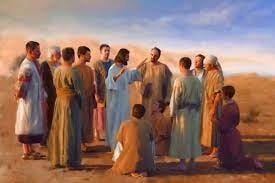Thinking about the word 'Discipleship'
Hello friends. I woke up the other day thinking about the word “discipleship” and how people understand the term. Developed during the writing of my dissertation, I have a very specific understanding of the word and the dynamics that are at play within discipleship. However, what I have discovered, both in Googling the word and in conversations with people within the United Church over the course of my ministry, is that there are quite different understandings, and comfort levels, with the word “discipleship”. I am currently working on a blog post about this, and I am curious to hear directly from you: What do you think of when you hear the word “discipleship”? How does it resonate for you? Please send me a note to: jessica@jessicahetherington.ca and let me know. This would be very helpful to my research and to how effectively I am able to present this idea to others. Thank you very much!
Responses to Last Week’s Newsletter:
Last week, I wrote about how we can choose to act for fossil fuel reduction, despite “political impossibility”. I also invited you to consider whether you would be willing and able to risk arrest for the planet, in the fight against climate change and other aspects of ecological devastation. In response, a subscriber sent me a blog post about their friend, Beth Carlson Malena, who is a pastor in Vancouver. In the post, Beth answers the question, “Why Did I Risk Arrest?” in protesting the Trans Mountain (TMX) Pipeline in 2019. I invite you to read this moving, insightful testimony of discipleship in action. Here is the link: https://ecoanxious.ca/stories/why-did-i-risk-arrest/.
I also received a heartfelt lament about the resistance and complacency that we sometimes confront in our communities of faith when we try to bring up issues of ecological and climate crisis and encourage action. This is a big issue, echoing the wider resistance to and lack of action in the face of dire emergency in society. What I am interested in hearing from you is this: How do you respond to resistance, complaceny, denial, and even anger, when ecological issues are raised in your spaces? What resources do you need to help you stay the course and hold fast? I’d love to hear from you: jessica@jessicahetherington.ca.
Are you a new subscriber? If you would like to receive a previous issue of my newsletter? Please let me know and I will happily send it out: jessica@jessicahetherington.ca
BLOG POST: Finding Joy in Discipleship (and the Kitchen)
Find it here: https://jessicahetherington.ca/blog/
Books for Transformation
There is so much out there to read and learn! Here I suggest two books: one that was useful to me in writing my PhD dissertation, and a more recent volume that I have come across.
Gaia and God: An Ecofeminist Theology of Earth Healing by Rosemary Radford Ruether (San Francisco: HarperSanFrancisco, 1992).
This book, published in 1992, is a foundational text for understanding the specialty of ecofeminist theology. Ecofeminism, which is the recognition and analysis of the connections between gender oppression and ecological degradation, has been a very helpful interlocutor with theology for understanding how Christianity has played a role in both the oppression of women and the Earth, as well as how we can envision new gender and human-earth relations. In this book, Radford Ruether examines creation stories, narratives of world destruction, and how traditional understandings of sin and the ‘fall’ have factored in to how women and the Earth have been viewed, and treated, within Christianity. She then explores resources for healing gender relationships and the Earth by looking at the covenantal and sacramental traditions, as well as the relationship between spirituality and politics. If you want to know more about ecofeminist theology, this is a very good text.
All We Can Save: Truth, Courage, and Solutions for the Climate Crisis edited by Ayana Elizabeth Johnson and Katharine K. Wilkinson (New York: One World, 2021).
Sometimes, it isn’t another article or book-length exposition about climate change that we need. Sometimes, we simply need poetry. This book recognizes the need for both, with a compelling combination of poetry and short essays on how we can respond to the climate crisis. There are short essays by well-known climate writers such as Emily Atkin and Naomi Klein, and powerful poems by Alice Walker, Mary Oliver, and Marge Piercy, as well as poets I didn’t know before, with poems titled “She Told Me the Earth Loves Us,” by Anne Haven McDonnell and “Ode to Dirt” by Sharon Olds. This is a book that you will want to purchase so that you can savour the readings slowly, and return to it again and again.
Have you read either book, or intend to? Please send me a note: jessica@jessicahetherington.ca.
Earth Community in Pictures
I was inspired by the pictures in last week’s newsletter to share some photos of the plants that share my home with me. The palnt to the left in the last photo is Mark’s plant, and I don’t know what it’s called. If you know, please let me know!
Joseph's Coat
African violets, and a plant from the grocery store that has bloomed again!
Now this is the mystery plant! The one on the left in the pic; what is it?
I would love to share more pictures of the wider Earth community, whether they are indoors or out, both flora and fauna. Send pictures to: jessica@jessicahetherington.ca.Thanks!
Upcoming Events
Guest Preaching: February 26, 2023 – Wall Street United Church, Brockville ON. More details to come.
Contact
Any questions or comments? Things you'd like to see in this newsletter? I'd love to hear from you. Please go to jessicahetherington.ca, or email me at: jessica@jessicahetherington.ca.












